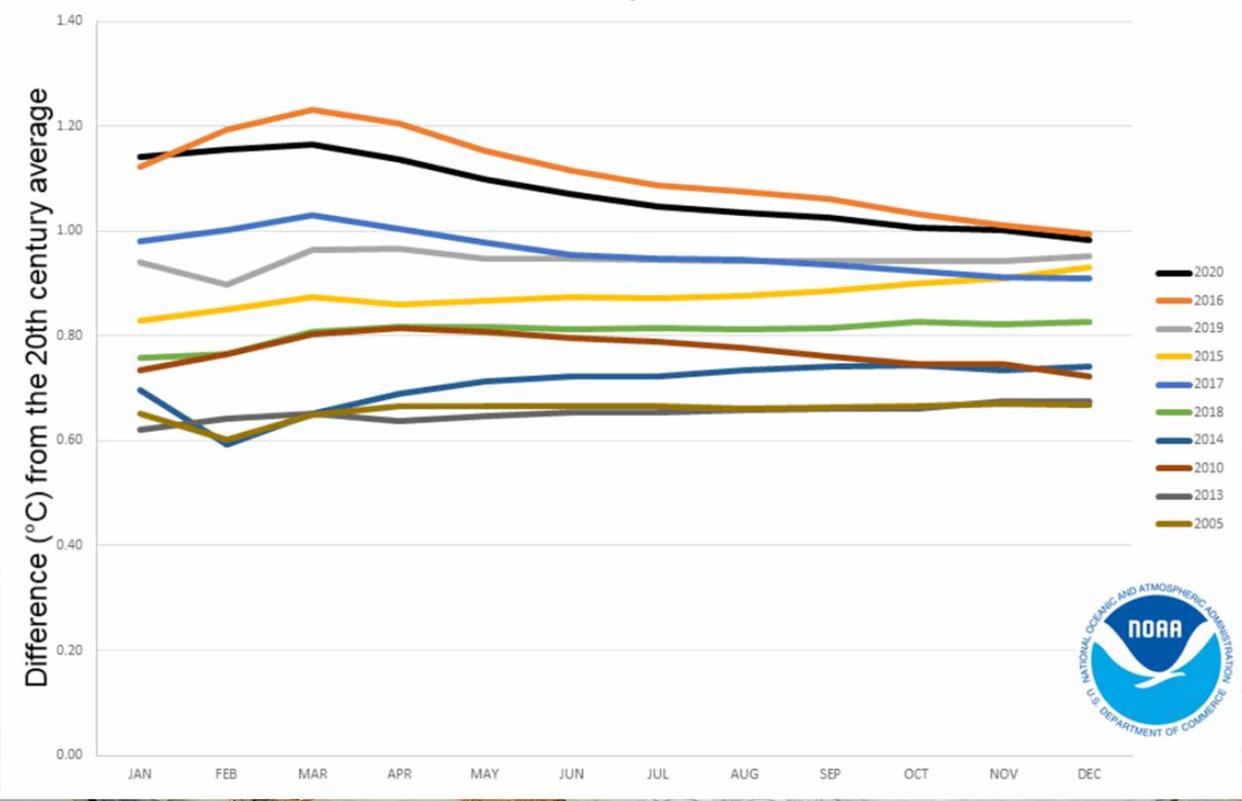When were the 10 warmest years on record?

What's happening? 2023 could be Earth's hottest year on record as several countries across the world are hit by scorching heatwaves.
Wildfires are raging in southern Europe and Canada, China has been battling 52.2C temperatures, while tourists have flocked to California's Death Valley hoping to experience a new record in one of the planet's hottest places.
According to Berkley Earth, an organisation that analyses global temperatures and predicts new records, the chances of this year being the hottest on Earth is now 81%.
It says this June was the hottest since records began in 1850, breaking previous records by a large margin, while ocean temperatures – a vital part of the Earth's climate system – also saw a record high for the month.
The beginning of July was also the hottest week on record for the planet as a whole, according to the UN's World Meteorological Organization, warning: “We are in uncharted territory and we can expect more records to fall."
The hottest years on record
The hottest year on record worldwide is 2016, when global average temperatures were 0.99C warmer than the mid-20th century mean, according to Nasa – thought it has also said that 2020 was in a statistical tie with 2016.
According to the European Union’s Copernicus Climate Change Service the last eight years have been the eight warmest on record.
Measurements vary between organisations, but according to the National Oceanic and Atmospheric Administration (NOAA), these are the 10 hottest years on record:

2016
2020
2019
2017
2015
2022 (tied with 2015)
2018
2021 (tied with 2018)
2014
2010
Britain experienced its hottest year on record in 2022, according to the Met Office, with an average temperature of 10.03C – the first time the 10C threshold has been crossed since records began in 1884.
The 2022 average was 0.89C above the 1991 to 2020 average and 0.15C above the previous hottest year, set in 2014.
Last eight years were hottest on record: research (The Hill, 2 mins)
What's going on in Europe?
Temperature records are being shattered in several parts of southern Europe, as wildfires rip through Greece, Spain, Italy the Canary Islands and even the Swiss Alps.
Meteorologists have predicted temperatures could surpass the current record of 48.8C, set in Sicily in August 2021.
Forecasters have suggested the mercury could climb as high as 49C in Sicily and Sardinia, which would be the hottest ever recorded in Europe. Italian authorities have issued red alerts for heat in 16 cities.

With an estimated 61,000 deaths in Europe associated with last year's heatwave, it raises grave concerns for 2023, with tourists and locals in the Mediterranean warned to stay inside during the hottest hours.
In Rome civil protection staff have been patrolling the streets looking for people in distress due to the heat, while volunteers in Greece have been handing out water.
How Europe's heatwave is impacting Spain, Italy, and other popular holiday destinations (Sky News, 6 mins)
2023: hottest year on record?
This year is likely to be the hottest on record for a few reasons.
Scientists are in agreement that the burning of fossil fuels are by far the largest contributor to global climate change - pushing temperatures well above pre-industrial times.
However this year could be particularly hot due to a weather pattern that comes round every few years. June saw the start of El Niño - a redistribution of heat into the central southern Pacific Ocean, which drives the weather patterns across the Pacific and across the world.
El Niño temporarily adds about 0.2C to average global temperature according to the Met Office, which may not seem high, but combined with the 1.2C above pre-industrial levels the planet has reached, it acts as a double-whammy.
The hottest year so far - 2016 - coincided with the last major El Niño event. This suggests there's a high likelihood of 2023 beating that record, with a scientist warning that 2024 could jump even higher.
2023 is set to be hottest on record amid global heatwaves, scientists say (The Independent, 3 mins)
Warnings as UK is 'dangerously' exposed
Scientists from the University of Oxford believe the UK is “dangerously unprepared” for the coming heat because most of its buildings were designed for a colder climate that is now disappearing.
They say without large-scale adaptation, such as introducing ceiling fans, better ventilation or shaded protection, people may begin to rely on air conditioning, which would place extra demand on the energy system and emit more greenhouse gases.
Dr Radhika Khosla said the problem barely features in the government’s planning, adding that "sustainable cooling barely has a mention in the UK’s net zero strategy".
The government published it's National Adaptation Plan on Monday, but it was criticised by experts for not going nearly far enough.
Dr Candice Howarth, a climate action researcher at LSE’s Grantham Institute, warned: "This is a new risk to the UK, it’s an invisible risk. You can almost see it as a silent killer."
'Dangerously unprepared': Oxford scientists warn we are not ready for heat (Oxford Mail, 2 mins)


